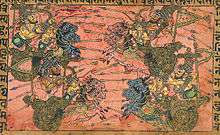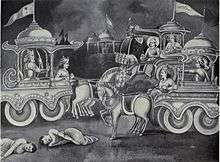Shikhandi
| Shikhandi | |
|---|---|
 Kripa fights with Shikhandi (top right) |
Shikhandi (Sanskrit: शिखंडी, Śikhaṇḍī ; Indonesian, Srikandi) is a character in the Hindu epic, the Mahabharata. He was born as a girl child named 'Shikhandini' to Drupada, the king of Panchala. Shikhandi fought in the Kurukshetra war on the side of the Pandavas, along with his father Drupada and brother Dhristadyumna. His son's name was Kshatradeva.[1]
Past Life
In Mahabharata there are conversations between persons and the personal biases of some along with the neutrality of others need to be taken into consideration. Mahabharata is also filled with politics and politicians. Many of the personalities mentioned in the Mahabharata were also under the influence of humanly existences hence one has to apply intelligence to gather what happened. The life of Shikandi (Shikandin) is such an example. There is the story of Shikandin being Amba in his previous birth while there is the story of Shikandin being a Rakshasa in his previous birth.
Due to the circumstances prevalent during the lifetime of Bhishma and due to the circumstances of the war that was being fought at Kurukshetra it could be seen that Bhishma and others were led to believe Sikhandin was the reincarnation of Amba especially since Sikhandin was born as a female before becoming a man. This was most likely due to the fact that Bhishma would not raise weapons on a woman and considered Shikandin a woman since he was born as a woman.
- Sikhandi's Rakshasa Incarnation
Rishi Vaisampayana to Janamejaya, son of Parikshit and grandson of Arjuna:
And know also that Sikhandin, who was at first a female, was (the incarnation of) a Rakshasa.— quote
Rishi Vyasa:
Sikhandin was a Rakshasa.— quote
Ulipi to Arjuna:
In the great battle of the Bharata princes, thou hadst slain the royal son of Santanu by unrighteous ways. What I have done has expiated thy sin. Thou didst not overthrow Bhishma while battling with thee. He was engaged with Sikhandin. Relying on him as thy help, thou didst compass the overthrow of Santanu's son. If thou hadst died without having expiated thy sin, thou wouldst then have fallen without doubt into Hell in consequence of that sinful act of thine. Even this which thou hast got from thy son is the expiation of that sin. Formerly, O ruler of Earth, I heard this said by the Vasus while they were in the company of Ganga, O thou of great intelligence. After the fall of Santanu's son, those deities, viz., the Vasus, coming to the banks of Ganga, bathed in her waters, and calling the goddess of that stream, they uttered these terrible words having the sanction of Bhagirathi herself, viz.,--Santanu's son Bhishma has been slain by Dhananjaya. Verily, O goddess, Bhishma then was engaged with another, and had ceased to fight. For this fault we shall today denounce a curse on Dhananjaya.--To this, the goddess Ganga readily assented, saying,--Be it so!--Hearing these words I became very much afflicted and penetrating into the nether regions represented everything to my sire. Informed of what had happened, my sire became plunged in grief. Repairing to the Vasus, he solicited them for thy sake, repeatedly gratifying them by every means in his power. They then said unto him, 'Dhananjaya has a highly blessed son who, endued with youth, is the ruler of Manipura. He will, standing on the field of battle, cast Dhananjaya down on the Earth. When this will happen, O prince of snakes, Arjuna will be freed from our curse. Do thou go back.--Thus addressed by the Vasus, he came back and informed me of what had happened. Having learnt all this, O hero, I have freed thee from the curse of the Vasus even in this way. The chief of the deities himself is incapable of vanquishing thee in battle. The son is one's own self. It is for this that thou hast been vanquished by him. I cannot be held, O puissant one, to have committed any fault. How, indeed, wouldst thou hold me censurable?'--Thus addressed (by Ulupi).— quote
The Vasus cursed Arjuna for killing Bhishma with the assent of Ganga the Holy River. Here it could be seen that Arjuna was held culpable by both the Vasus and Ganga.
- Sikhandi's Amba Incarnation
Shikhandini or Shikhandi had been born in a previous lifetime as a woman named Amba. Amba was the eldest daughter of King of Kashi. Along with her sisters Ambika and Ambalika, she was taken by force by Bhishma from their Swayamvara. He presented them to Satyavati for marriage to Vichitravirya, the crown prince of Hastinapur.
Vichitravirya married only her sisters, because Amba told Bhishma that she had been promised to the Salwa, the King of Saubala and was not ready to marry anyone else. Hearing this from her, Bhishma sent Amba with grandeur to Shalva's place. But Shalva rejected her as well, in shame of losing the combat against Bhishma at the Swayamvara. Amba then returned to Bhishma and demanded that he marry her. He declined since he had already taken a vow of celibacy.
Enraged that she was going to be an unmarried woman, she swore to kill him, and tried to persuade other kings to wage a war with Bhishma. None agreed for they were afraid of incurring the wrath of the great warrior. Amba managed to get Parashurama, Bhishma's guru, to champion her cause. However, not even Parashurama could defeat Bhishma.
According to the summary by C. Rajagopalachari, she resorted to penance and received a garland of blue lotuses from Lord Subrahmanya and it was foretold that anyone wearing the garland would become the cause of Bhishma's death. She again with no avail tried to persuade the warriors to accept the garland and champion her cause. But again none wanted to antagonize Bhishma. Amba, in anger, hung the garland on the gates of King Drupada and left in agony.[5]
Amba was reborn as Sikhandini, the daughter of King Drupada.
- Sikhandi's Childhood and Sex-Change
In most versions of the story, Sikhandi is male but born-female. When Sikhandini changes her sex, she becomes Sikhandi but is a eunuch.
According to C. Rajagopalachari's Mahabharata summary, when Shikhandini was still a young woman she discovered the garland of ever-blooming blue lotuses hung on the palace gate. Shikhandini put it around her neck. Actually it was Amba who had hung the garland given to her by Lord Kartikeya. When Drupada saw his daughter wearing the garland, he quaked with fear at the thought of becoming Bhishma's enemy and Shikhandini was banished from the kingdom. She performed austerities in the forest and was transformed into a male named Shikhandi.[6] According to Vyasa Mahabharata, Shikhandini exchanged her sex with a Yaksha.
In another version of the story, Drupada desires an heir, and wanders the forest to settle his disquieted mind. He comes upon Shikhandini. Shikhandini is born through divine filiation (from Shiva); when Drupada picks her up, a heavenly voice tells Drupada to raise her as a man. Drupada raised his daughter as a son and had Shikhandini married to a princess of Dasharna. She complained to her father, Hiranyavarna, that her husband was a woman. When the king sent people to check this fact, Shikhandini escaped into a forest, where she met a Yaksha who exchanged his sex with her. The Yaksha Raj sees the yaksha as a girl and curses him that he will remain in the form till Shikhandi dies, keeping the sex-swap in place.[7][8] In many versions of the story, the change results in Shikhandi being a eunuch; in others, it doesn't.
In some versions of the story, Amba is simply reborn as a male Shikhandi, sometimes whole and sometimes a eunuch. In even other versions, Shikhandi is a male but gay, due to Shiva's boon that Amba will remember all the details of her past life. In early versions of the Mahabharatha, Shikhandi is still Amba-reborn, but also a complete female. Because Panchala doesn't practice gender discrimination, she is trained to become a warrior and fights in the Kurukshetra War (this being the original reason why Amba kills herself again and again, wanting to be born to a culture that will allow her to fight Bhishma).
Battle of Mahabharat

In the battle of Kurukshetra, Bhishma recognised him as Amba reborn, and not wanting to fight 'a woman', lowered his weapons. Knowing that Bhishma would react thus to Shikhandi, Arjuna hid behind Shikhandi and attacked Bhishma with a devastating volley of arrows. Thus, Shikhandi's role was instrumental in Bhishma's death.
Shikhandi was finally killed by Ashwatthama on the 18th day of battle.Shikhandi is killed in a sword fight with Ashwatthama when Ashwatthama, Kripacharya, and Kritaverma attacked the Pandava camp on the night of the final day of battle.[9][10]
References
- ↑ http://www.sacred-texts.com/hin/m08/m08006.htm
- ↑ http://www.sacred-texts.com/hin/m01/m01068.htm
- ↑ http://www.sacred-texts.com/hin/m15/m15031.htm
- ↑ http://www.sacred-texts.com/hin/m14/m14081.htm
- ↑ Link text
- ↑ Mahabharata Summary By Rajaji, Mahabharata Stories , Stories and Characters from Mahabharata, Mahabharatam in Telugu, Tamil, Kannada, Hindi
- ↑ MAHABHARAT : The king of Kashi's three beautiful daughters, Amba, Ambika and Ambalika
- ↑ The story of Shikandi - Characters/Persons from Mahabharata , Stories and Characters from Mahabharata, Mahabharatam in Telugu, Tamil, Kannada, Hindi
- ↑ http://www.urday.in/mafterbattle.htm
- ↑ K M Ganguly(1883-1896). The Mahabharatha Book 10: Sauptika Parva section 8 Ashwatthama killing Shikindin ,October 2003,Retrieved 2015-10-2
External links
| |||||||||||||||||||||||||
| |||||||||||||||||||||

